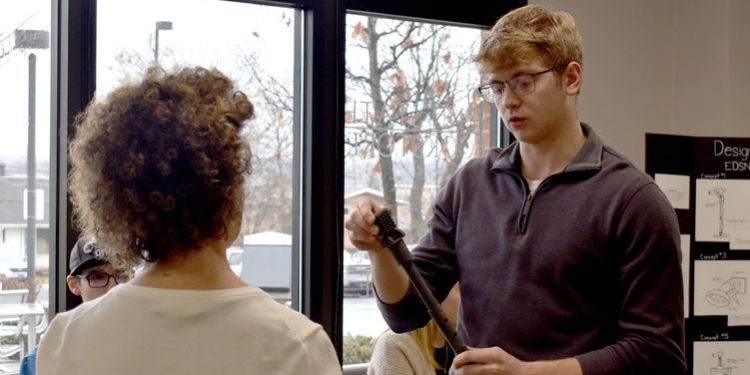DUBOIS – Students in Penn State DuBois’ occupational therapy assistant and engineering programs recently presented collaborative projects they have been researching and producing this semester. The goal of these projects was to identify, research and make a piece of adaptive equipment that would benefit someone with a disability.
Working together, OTA students find a need for someone with a disability, conduct research into the disability and develop the idea for the equipment that would help that person. Then, they combine their efforts with engineering students to further design their equipment and make it into a prototype. Using the 3D printing technology available in the Idea Lab on campus, each group made a tangible version of their equipment that they could present to the campus community.
Collaboration projects between OTA and engineering students began in 2012 when therapeutic devices were designed for a local retirement community. Since then, LuAnn Delbrugge, associate teaching professor for OTA, and Daudi Waryoba, associate professor for engineering, have continued to foster this collaboration into what it has become today.
“I think the projects are a great way for both groups of students to bring their unique strengths to the table and to learn more about the other profession,” said Delbrugge. “Interprofessional collaboration is an important element in education because it prepares students for real-life work experiences where they will work with other professionals. Additionally, students can add this experience to their professional resumes, indicating they were a member of a group that designed a piece of adaptive equipment to be used by people with physical limitations.”
“We are using these collaborative projects to prepare our students for real-life work experiences,” Waryoba added. “Penn State strives to prepare engineering students to be world-class engineers that are excellent collaborators. I would equally say the same for OTA students as well.”
This year, students designed a wide variety of equipment that solved very different needs, including a suction-based ice cube remover, a portable hair shampoo application device, an extendable razor attachment, a wall mountable hair dryer and an adaptive hunting and walking stick that could also be used as a gun rest. Each of these projects looked to assist those with different disabilities that would make these tasks difficult for them. While each of these pieces of equipment were designed with a specific need in mind, groups also noted how they found other usage ideas during development.
Montana Hetrick, a sophomore OTA student, first came up with the idea for the wall mountable hair dryer after thinking about how much time and effort a person with no limitations must put in to dry their hair.
“Their arms get tired because of how long their arms are above their head,” Hetrick said. “I then thought about since this is an issue for someone with no limitation, this must be a major challenge for someone with a limitation, limited range of motion or an amputation in the upper extremities.”
This year marked the first year that students were required to use the 3D printing capabilities of the Idea Lab to make a prototype of their design. This not only lets students get their hands physically on their ideas, but also have a great visual aid to show during their presentations. For both engineering and occupational therapy alike, 3D printing has more commonplace usage than ever before.
“This collaborative learning experience allows students to navigate how to work with a team and share ideas,” Delbrugge said. “The addition of 3D printed materials for their projects allows the students to be involved in cutting edge technology and provides more options for their projects.”



